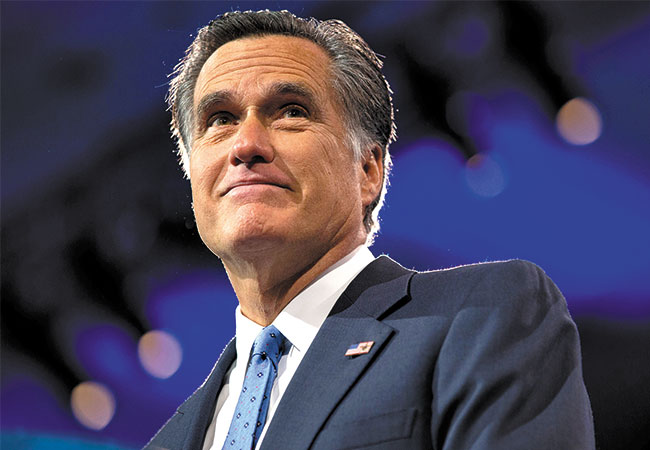Getting To Know Mitt, Just A Bit Late
On presidential election night 2012, Mitt Romney related a comment made by one of his teary-eyed supporters: “When you think about it, we kinda had to steal the Republican nomination because our party is Southern, evangelical and populist, and you’re Northern, Mormon and rich.”
That statement resonates throughout Mitt, a documentary on Romney’s two campaigns for the presidency recently released by Netflix. Greg Whiteley, a friend of one of Romney’s handsome sons, began shooting footage in 2006, when the ex-Massachusetts governor began considering a campaign for the Republican presidential nomination in 2008.

Former Massachusetts governor and 2012 Republican presidential candidate Mitt Romney March 15, 2013, at the 40th annual Conservative Political Action Conference in National Harbor, Md. | AP photo/Jacquelyn Martin
Romney allowed Whiteley extraordinary access: to family conclaves on the pros and cons of running, to the candidate’s nerves prior to debates with John McCain in 2008 and Barack Obama in 2012, and to the exultation of his family and supporters following Romney’s crushing defeat of Obama in their first debate.
Whiteley also sees quiet moments between Romney and wife Ann, moments of uncertainty and affection. They and many other scenes speak to the dominant criticism made of Romney’s 2012 campaign: that his campaign staff and consultants failed to show his human side. Surely he was smart, handsome, extremely well-spoken (if occasionally misspoken), but who was he?
Whiteley’s camera shows a man who loves his family, is courteous to all, who laughs easily and, most often, at himself and his foibles. Son Tagg Romney says about his dad, “He hates to disappoint people,” and that self-effacement is apparent throughout the film. With Mitt Romney, it’s not all about him.
Unfortunately, Whiteley’s access also supports observations made by observers without such access during the campaign: his stiffness, demonstrated both verbally and physically, the squeaky cleanness of himself and his family and, frankly, his wealth.
When the votes were tallied, Obama had 65,917,258 of them; Romney 60,932,235. Obama’s electoral college margin was 332 to 206; he garnered all but one of the so-called battleground states.
But what had Obama won? To begin with, he won two unpaid-for wars and the Great Recession, the latter the worst economic downturn the nation had seen since the Depression of the 1930s. His efforts to ameliorate it with an $800 billion federal stimulus drew howls from conservatives, who could only equate spending with surging budget deficits, not job creation or, in this instance, preservation.
Obama’s effort to steal the formula for Massachusetts’ Romneycare to create a national health care system also drew derision from the right, helping to create the tea party takeover of the House of Representatives in 2010 – in other words, Washington gridlock.
In retrospect, Obama may never have had a chance. In the eyes of shocking percentages of the Southern, evangelical, populist party, Obama was Kenyan, Muslim and a Commie.
His legacy may have been outlined in Obama’s State of the Union address last week: executive orders that work the edges of America’s yawning gap between rich and poor, a Republican takeover of the Senate in November, and a Rand Paul, Rick Santorum or Ted Cruz Republican presidency in 2016.
Two years from now, the Southern, evangelical, populist party will have no place for a Romney-style presidential candidate, if they could find one. Its best moderate prospect, New Jersey Gov. Chris Christie, may have lost hope of nomination on a gridlocked bridge.





